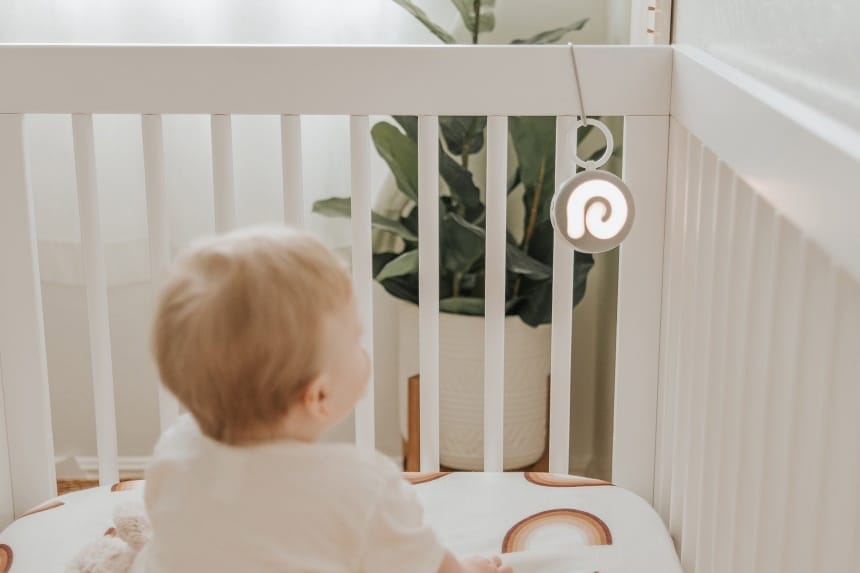

11-month babies resist naps and bedtime, sleep for only a short while, or they wake up frequently during the night? This is a common deal with sleep regressions.
It is related to the growth and development of babies. Around their first birthday is when they are learning how to talk, crawl, walk, and other milestones that will be more fun to them than sleeping. Fortunately, 11-month baby sleep regression is a temporary period that usually lasts for up to two weeks. However, it can be very overwhelming to adjust to the baby’s new sleeping routines. We have featured the solutions that will help you to survive and to keep your sanity during this transition.

We have listed the ages around which sleep disruptions occurs. Since it varies from one child to another, some may have it at all those ages or skip it at some ages. So, it is not a must that an 11 month baby will have sleep regression.
Below we have explained the signs that indicate 11-month-old sleep regression, so you can be ready if, and when, it happens.
The 3 major signs that symbolize this period of sleep disruptions are:
There are a number of reasons that can cause sleep regression, but the key ones are:
The major cause of 11 month old fighting naps is their physical milestones. The infant has started to explore the world around and wants less time sleeping. They are excited to stay awake and play, stand up using furniture, and toddle.
If you notice your baby becoming extra clingy when you place them on their crib mattress , or panicking at the thought of you leaving the room, this is likely 11 month sleep regression separation anxiety. It is normal at this age, and the reason they want you close is to feel secure.
Since there is not one solution that will help you navigate sleep regression, we have featured a number of options that will ease the frustration and help your baby to sleep better.
If you are used to nursing your baby to sleep, they may start associating food with sleep. This can be a difficult habit to break because they will always be expecting you to feed them in order for them to sleep. Try to change the routine to eating, playing and then sleeping to break the negative sleep associations.

The trick to ensuring your baby sleeps restfully through the night may lie in adjusting their sleeping schedule. As babies grow, a change in their sleeping and wake-up routine might be required. You can shift their bedtime as long as you ensure it is earlier in the evening and you keep it consistent. Incorporate certain routines like baths before sleeping to relax them so they can sleep well.
Children give sleep cues when they are ready for a nap. These cues vary from one child to another and evolve as the baby grows older. For this reason, you need to know some of the typical pointers to look for to identify sleep signs. These are rubbing their eyes, increased irritability, tantrums, disinterest, increased impatience, and crying. Another early sign that your baby wants to sleep is an increased need to be cuddled.
Once you notice the above signs, initiate sleep or your baby will become more irritable and throw more tantrums.
It is easier for babies to sleep when they are tired. Keep your child busy during the day with games and the skills they have acquired. This includes encouraging their mobility since by now they are likely to be crawling or walking. Clear space where they can play with their toys and other safe items, and they can practice standing on sturdy chairs and tables. Keep an eye for them as they tend to be very curious at this age. Stimulate their brain and speech development with fun conversations and activities. The point is for the babies to remain active and wear themselves out during the day so they can be too exhausted to be distracted at night. They will actually be looking forward to rest and relax when it is time to sleep.
If your child refuses to sleep at the designated time and changing their sleeping time is not working, another way you can handle 11 month baby sleep regression is by getting the whole family to fit to the baby’s sleeping schedule of early sleeping and early waking time. Sleeping early is actually advantageous for you, too, because it would also make it more bearable for you to wake up early and well-rested, and you can get other chores done in good time.
We understand how exhausting it can be to deal with 11 month old fighting naps. But whatever you do, try to stay calm. Becoming angry while infants are misbehaving is the worst mistake you can make. Children are sensitive and they are like sponges; they will pick up on your emotions and if you are stressed or frustrated, it could transfer to them and make it difficult for them to relax enough to sleep.
Avoid a meltdown and take a breather for a few minutes. You could try meditation, deep breaths, chocolate, or anything that will help you to relax.
Remember that this is a temporary transition that will usually be over in approximately two weeks, and instead, focus on the little one’s growth and the skills they are learning. Celebrate them standing up on their own, learning new words and mastering other milestones.
Earlier in our discussion on how to deal with 11-month-old sleep regression, we mentioned how some habits that your baby associates with bedtime can affect their sleep as they could become dependent on these schedules. These are routines such as feeding your baby just before their nap. Since babies prefer consistency and routines, setting and sticking to a regular sleeping schedule enables the baby to expect bedtime at a particular time. Once you have decided on the ideal bedtime, do not vary it by more than 15 minutes every night since consistency is key.
There are relaxing activities you can include to the bedtime routine so your child can associate them positively with sleep.
This could be singing them a lullaby, reading them a book or giving them a bath to make them more receptive about going to bed and to help them sleep better.
Spending time outside getting more fresh air will do wonders for you and the baby.
Melatonin controls our sleep cycle. The sleep inducing hormone is mostly secreted at night and it is responsible for initiating deep sleep and improving our sleep quality. Several
studies
Trusted Source
Effects of exercise with or without light exposure on sleep quality and hormone reponses
The objectives of the present study were to determine the effect of sun exposure and aerobic exercise on quality of sleep and investigate sleep-related hormonal responses in college-aged males.
www.ncbi.nlm.nih.gov
show that repeated exposure to sunlight increases melatonin levels and maintains circadian rhythm.
Circadian phase refers to the mental, physical and behavioral changes that occur in a 24-hour cycle. It is the body’s internal clock that controls our sleep-wake schedule and it mainly responds to light and dark. As well as our sleep pattern, the circadian cycle also affects our eating habits, hormones and body temperature.
To combat 11 month baby sleep regression, take your little one outside and enjoy some vitamin D, active games and other creative exploits. Remember to dress for the weather and do not forget sunscreen.
Find time to rest and focus on you. Ask someone to watch the baby, even if it is just for a few minutes. This could be a partner, nanny, friend, relative, or neighbor. After all, it’s been said that it takes a village to raise a child. Use the free time to take a short walk, a nap or a soothing bath.
You can also ask someone to help you with other chores while you tend to the little one to avoid being overwhelmed.
An effective method of tackling 11 month old sleep regression is a consistent sleeping schedule. However, sometimes you should just go with the infant’s choice of not sleeping but don’t allow them to break the schedule for more than one time. Other times, your toddler will refuse to sleep and keep you awake for several hours during the night. In such situations, you will need to be flexible and just go with the flow.
As your child grows older, it is common for them to take fewer or shorter naps. To prevent this from interfering with their sleep quality, you should adjust to an earlier bedtime, or as needed, to fit nap schedules. Ideally, a baby at this age needs two naps in a day to get enough sleep.
Although it does not occur in every baby, sleep regression is certainly commonplace. It is a source of frustration for most parents who do not understand how to deal with the sudden change of sleeping patterns that makes bedtime a nightmare for their little ones. Some of the advice may seem contradictory. For example, observing a strict bedtime routine vs. being flexible and going with the flow. This is because babies are different and unpredictable, and what works for one baby or situation may not be applicable for another. That is why we have included several solutions on how to deal with 11 month sleep regression so you can have varied options. Most importantly, remain calm. It will be over in about two weeks.





